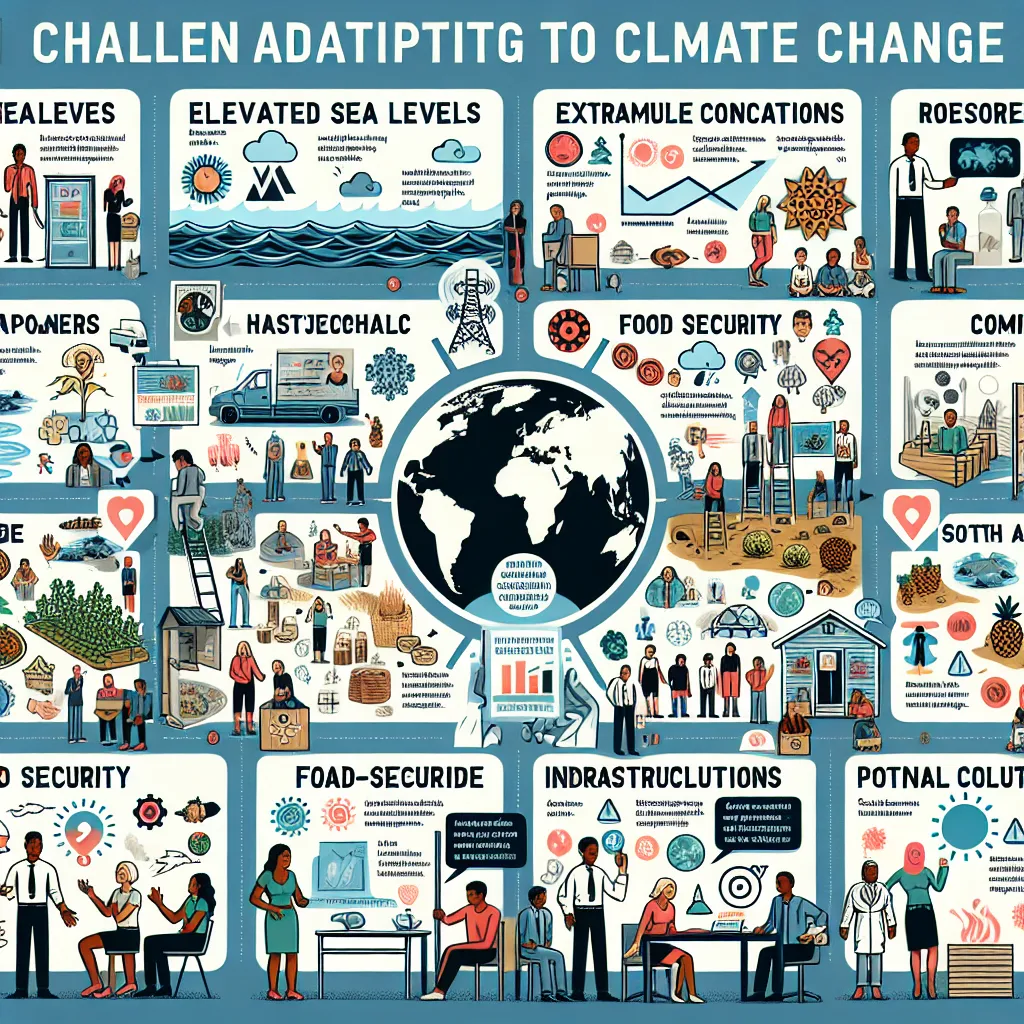Climate change adaptation challenges have become an increasingly prevalent topic in IELTS Writing Task 2. Based on recent trends and the growing global concern about climate change, it’s highly likely that this theme will continue to appear in future IELTS exams. Let’s explore a sample question and how to approach it effectively.

Analyzing the Question
Let’s consider the following IELTS Writing Task 2 question:
Climate change adaptation is becoming increasingly important for many countries. However, there are significant challenges in implementing effective adaptation strategies. What are some of these challenges, and how can they be overcome?
This question focuses on the difficulties faced in adapting to climate change and requires you to:
- Identify challenges in implementing climate change adaptation strategies
- Suggest solutions to overcome these challenges
Sample Essay
Here’s a model essay that addresses the question:
Climate change is undeniably one of the most pressing issues of our time, and adapting to its impacts has become a crucial concern for nations worldwide. While the need for adaptation is clear, implementing effective strategies poses significant challenges. This essay will explore some of these obstacles and propose potential solutions.
One of the primary challenges in climate change adaptation is the uncertainty surrounding future climate scenarios. Scientists can provide projections, but the exact impacts on specific regions remain unclear. This uncertainty makes it difficult for policymakers to develop targeted, long-term adaptation plans. To address this, governments should invest in advanced climate modeling technologies and collaborate with international research institutions to improve the accuracy of climate predictions.
Another significant hurdle is the substantial financial investment required for adaptation measures. Many countries, especially developing nations, struggle to allocate sufficient funds for climate adaptation while addressing other pressing socio-economic issues. To overcome this, international cooperation is crucial. Developed countries should fulfill their commitments to climate finance and support vulnerable nations through mechanisms like the Green Climate Fund. Additionally, public-private partnerships can be leveraged to mobilize resources for adaptation projects.
The lack of public awareness and engagement also impedes effective adaptation. Many people remain unaware of the urgent need for adaptation or are unsure how to contribute. To combat this, governments and NGOs should launch comprehensive public education campaigns highlighting the local impacts of climate change and practical adaptation measures. Engaging communities in participatory planning processes can also foster a sense of ownership and increase support for adaptation initiatives.
Furthermore, institutional and governance challenges often hinder the implementation of adaptation strategies. Bureaucratic inefficiencies, conflicting jurisdictions, and a lack of coordination between different levels of government can slow down or derail adaptation efforts. To address this, countries should establish dedicated climate change departments or agencies with clear mandates and the authority to coordinate across sectors. Streamlining approval processes for adaptation projects and enhancing inter-departmental collaboration can also improve efficiency.
Lastly, the transboundary nature of climate impacts presents a unique challenge, as effective adaptation often requires cooperation between neighboring countries. Issues such as shared water resources or cross-border migration due to climate change demand collaborative solutions. To overcome this, regional cooperation frameworks should be strengthened, and international agreements on climate adaptation should be pursued.
In conclusion, while the challenges of implementing climate change adaptation strategies are substantial, they are not insurmountable. By addressing uncertainties through improved research, mobilizing financial resources, raising public awareness, enhancing governance structures, and fostering international cooperation, countries can significantly bolster their adaptive capacity. As the impacts of climate change continue to intensify, overcoming these challenges becomes not just important, but essential for the resilience and sustainability of communities worldwide.
(Word count: 420)
Writing Tips for Climate Change Adaptation Topics
When writing about climate change adaptation challenges, keep the following tips in mind:
-
Use specific examples: Incorporate real-world examples of adaptation challenges and successful strategies to support your arguments.
-
Balance global and local perspectives: Discuss both worldwide challenges and region-specific issues to demonstrate a comprehensive understanding.
-
Employ a range of sentence structures: Vary your sentence length and complexity to maintain reader engagement and showcase your language skills.
-
Use appropriate transition words: Ensure smooth flow between paragraphs and ideas using transitions like “furthermore,” “moreover,” and “in addition.”
-
Maintain objectivity: Present a balanced view of the challenges and potential solutions without bias.
Key Vocabulary for Climate Change Adaptation
Here are some essential vocabulary items to use when discussing climate change adaptation:
-
Resilience (noun, /rɪˈzɪliəns/): The ability to recover quickly from difficulties.
-
Mitigation (noun, /ˌmɪtɪˈɡeɪʃn/): The action of reducing the severity, seriousness, or painfulness of something.
-
Vulnerability (noun, /ˌvʌlnərəˈbɪləti/): The quality or state of being exposed to the possibility of being attacked or harmed.
-
Adaptive capacity (noun phrase): The ability of systems, institutions, humans, and other organisms to adjust to potential damage, take advantage of opportunities, or respond to consequences.
-
Infrastructure (noun, /ˈɪnfrəstrʌktʃə(r)/): The basic physical and organizational structures and facilities needed for the operation of a society or enterprise.
-
Ecosystem services (noun phrase): The benefits people obtain from ecosystems.
-
Sustainable (adjective, /səˈsteɪnəbl/): Able to be maintained at a certain rate or level.
-
Biodiversity (noun, /ˌbaɪəʊdaɪˈvɜːsəti/): The variety of plant and animal life in the world or in a particular habitat.
-
Stakeholder (noun, /ˈsteɪkhəʊldə(r)/): A person with an interest or concern in something, especially a business.
-
Catastrophic (adjective, /ˌkætəˈstrɒfɪk/): Involving or causing sudden great damage or suffering.
Conclusion
Climate change adaptation challenges are likely to remain a significant topic in IELTS Writing Task 2. By understanding the key issues, employing effective writing strategies, and using appropriate vocabulary, you can craft compelling essays on this crucial global issue. Remember to practice with various question types related to climate change adaptation, such as discussing the role of technology in adaptation efforts, examining the economic impacts of adaptation measures, or exploring the challenges of adapting agriculture to changing climate conditions.
For more information on related topics, you might find these articles helpful: